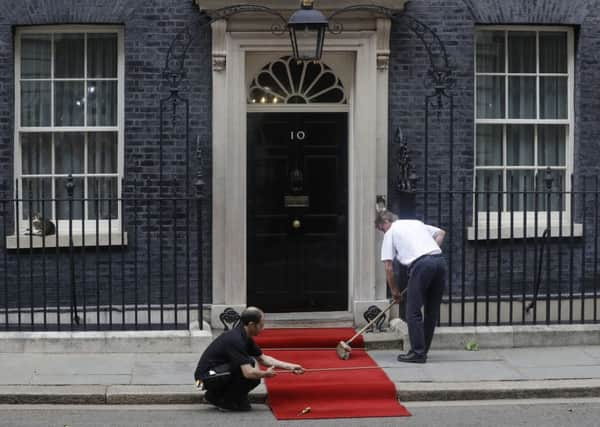Bill Jamieson: Nervous wait for leader who can deliver fiscal breakout


The economy as measured by GDP suffered a sharp decline in April, as firms began to unwind their inventories. This means that we are likely to see a modest contraction across the second quarter, and already modest growth forecasts for the year overall are now being pared back.
So, domestically, economic growth is sluggish, while the global economy is in a fragile state, the US is slowing and Germany, Europe’s economic powerhouse, is experiencing a marked downturn. The World Bank now expects global growth to be a weaker than expected 2.6 per cent this year, down from 2.9 per cent expected in January. For the advanced economies specifically, it expects growth of 1.7 per cent this year, slowing to 1.5 per cent in 2020 and 2021, with the growth downgrade to the Eurozone especially notable: it projects an increase of just 1.2 per cent this year.
Advertisement
Hide AdAdvertisement
Hide AdGlobal economic activity, it concluded, “continued to soften at the start of 2019, with trade and manufacturing showing signs of marked weakness. Heightened policy uncertainty, including a recent re-escalation of trade tensions between major economies, has been accompanied by a deceleration in global investment and a decline in confidence.”
Meanwhile, Brexit, in whatever form it takes, will entail potentially painful economic adjustments which fiscal policy could help to smooth. In any event, the UK’s economic performance is crying out for a gear-change: over the past decade or so the UK’s average annual growth rate has been 1.4 per cent, some 60 per cent below the 3.5 per cent world average.
Now an opportunity for a major policy change lies ahead for a new cabinet to grasp. Interest rates remain at historic lows and borrowing for investment has seldom been cheaper. And there is room for a government infrastructure spending boost. The budget deficit has been brought down to £23.5 billion (1.1 per cent of GDP) in the financial year to March, the lowest full year financial borrowing for 17 years. And government debt overall has started to edge down.
Thus for a new chancellor there is a chance to break free from the constraints of recent years and scope for a fiscal boost post-Brexit. Tory leadership contenders have put forward an ambitious array of tax cutting measures – from raising the threshold for liability to higher income tax, through tax cuts for the lower paid to proposals to scrap VAT and replace it with a sales tax.
How these tax reductions could be afforded – Boris Johnson’s tax cutting pledge is reckoned by the IFS to cost £9.6bn, while Dominic Raab’s plan to cut the basic income tax rate by 5p is estimated by the Resolution Foundation to cost £32bn – is unclear, and there is strong dispute as to whether these would provide an effective economic uplift.
But even were a tax-cutter to make it to 10 Downing Street, who dares to make the break? It is by no means clear that any radical tax cutting measures would be passed by the Commons, with prominent doubters on the government back benches. And a new prime minister may be in office only a few months before renewed Brexit gridlock makes a general election unavoidable. Months of acrimonious division lie ahead, bringing pressure to avoid radical changes that could add to economic uncertainty, unsettle market confidence and exacerbate a run on sterling.
In Scotland we have fiscal challenges of our own. Finance Secretary Derek Mackay let fall last week that public spending cuts may be needed to help deal with a possible Scottish budget shortfall of more than £1bn. He said that he “may have to look at spending” as the Treasury prepared to cut the Scottish block grant over the next three years. The remarks came in the wake of a warning from the Scottish Fiscal Commission that ministers may have to raise taxes or cut spending because of reconciliations, or corrections, to estimated income tax revenue. As for economic growth in Scotland, it forecast just 0.8 per cent this year, down 0.4 per cent on original estimates, rising to only 0.9 per cent next year – another downward revision.
Last week the Royal Bank of Scotland’s Purchasing Managers’ Index report for May warned that Scotland’s private sector has suffered a drop in output for the fifth time in six months. A modest pick-up in activity in April has been reversed and confidence within the business community remains subdued amid Brexit concerns and forecasts of weaker growth.
Advertisement
Hide AdAdvertisement
Hide AdAll this makes the coming period even more unsettling and exasperating for business than the enterprise-depressing uncertainty of the past three years. Morale is already at rock-bottom. Latest research released last week from the Federation of Small Businesses revealed a troubling state of affairs. Its Small Business Index has now fallen for four consecutive quarters – the first time in its near 10-year history. More than two-thirds (68 per cent) of small firms do not expect their performance to improve next quarter.
FSB chairman Mike Cherry said: “Small business owners are increasingly being left with our heads in our hands as we’re hit on all sides by fresh costs, reporting requirements, political uncertainty, and the re-emerging threat of a cliff-edge no-deal Brexit in just 20 weeks’ time… Increasing tax, regulatory and employment burdens are weighing heavy on small businesses, making it harder for us to hire, export and expand. Politicians need to up their game. We can’t hope to end this confidence losing streak until they make it easier for small firms to compete.”
The case for a fiscal break-out – a package of business tax cuts and investment incentives to spur the enterprise sector – is compelling. But for all the pledges of Conservative leadership candidates and a change in the premiership, the pathway to delivery looks as clogged and confused as ever.